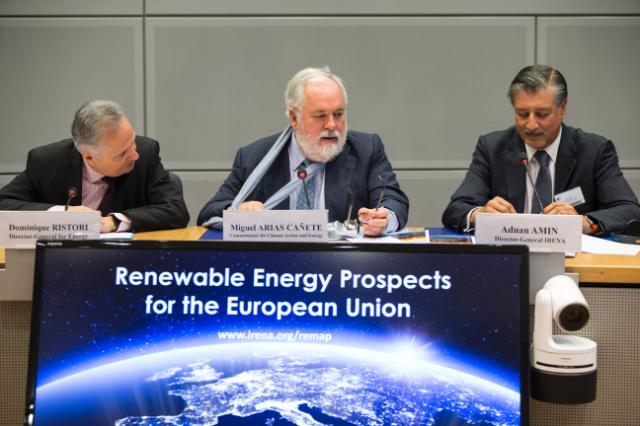The new 2030 renewable energy target of 32% is binding and, according to the EU Commission’s statement, may be subject to upwards revision by 2023. The Commission also stressed that two out of eight legislative proposals for the Clean Energy for All Europeans package, have now been agreed upon.
An explanatory memorandum issued by the EU Commission in November 2016, suggested that the EU’s Renewable Energy Directive, adopted in 2009, would only lead to a 24% renewable energy share, if no policy changes were made. On the back of this, the Commission pledged a minimum of 27%, also in 2016. Today’s announcement far exceeds this proposal.
Commissioner for Climate Action and Energy, Miguel Arias Cañete said, “Renewables are good for Europe, and today, Europe is good at renewables. This deal is a hard-won victory in our efforts to unlock the true potential of Europe's clean energy transition. This new ambition will help us meet our Paris Agreement goals and will translate into more jobs, lower energy bills for consumers and less energy imports.
“I am particularly pleased with the new European target of 32%. The binding nature of the target will also provide additional certainty to the investors. I now call on the European Parliament and the Council to continue negotiating with the same commitment and complete the rest of the proposals of the Clean Energy for All Europeans Package. This will put us on the right path towards the Long-Term Strategy that the Commission intends to present by the end of this year.”
Between November 2017 and January 2018, the EU Commission, Parliament, and Council put forward their draft proposals for 2030 renewable energy share. The Parliament led the charge at 35%, while the Council and Commission went into the negotiations with 27%.
On June 11, meanwhile, Spain's and Italy’s Ministers Ribera and Pugliese called for a 33-35% renewable energy goal, raising hopes that the council's position would be adjusted upwards. As Spain's and Italy’s Ministers stressed, their future stances on renewable energy are much more positive than those of their predecessors.
Last night’s vote was long awaited by stakeholders in the renewable energy industry. James Watson, CEO SolarPower Europe commented, ‘The deal is a good one for solar. We see a much more ambitious target than was expected just a few months ago and importantly we have a strong framework for self-consumption and prosumers. Households wake up this morning with the knowledge that they will have a new right – the right to self-generate, consume and store the energy they produce. This is a major achievement.
“We are also delighted to see that administrative procedures will be streamlined so that permitting for new installations can take no more than 1 year – this will hugely reduce the soft costs of solar. The deal also provides the freedom for countries to do solar specific tenders, which is a major bonus for the sector and will help support deployment of even greater volumes of solar. Overall there is much to celebrate, and we congratulate the European policymakers on a historic deal.”
The decision made last night will have to be formally approved by the European Parliament and Council, in order to update the Renewable Energy Diorective legislative text. Since Council and Parliament were heavily involved in the process leading up to the decision, it is expected that this final step will pass without any obstacles.
Following the adoption of the new text in the REDII, member states will have 18 months to transpose the new directive into national law. The latest effort comes amidst a range of energy related revisions of inter alia energy efficiency and energy performance of buildings directives.
This content is protected by copyright and may not be reused. If you want to cooperate with us and would like to reuse some of our content, please contact: editors@pv-magazine.com.




1 comment
By submitting this form you agree to pv magazine using your data for the purposes of publishing your comment.
Your personal data will only be disclosed or otherwise transmitted to third parties for the purposes of spam filtering or if this is necessary for technical maintenance of the website. Any other transfer to third parties will not take place unless this is justified on the basis of applicable data protection regulations or if pv magazine is legally obliged to do so.
You may revoke this consent at any time with effect for the future, in which case your personal data will be deleted immediately. Otherwise, your data will be deleted if pv magazine has processed your request or the purpose of data storage is fulfilled.
Further information on data privacy can be found in our Data Protection Policy.